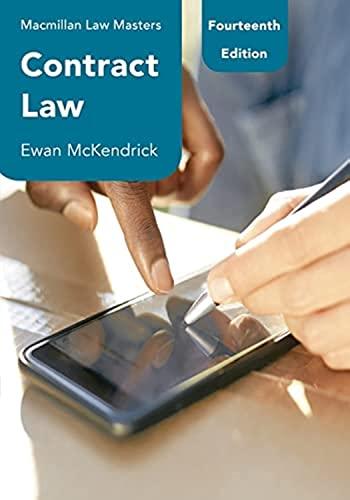Question
Pat is 22 years old. Pat is a senior at Roosevelt University and will be the first college graduate of their family as Pat is
Pat is 22 years old. Pat is a senior at Roosevelt University and will be the first college graduate of their family as Pat is a first generation college student. After graduation from Roosevelt this May, Pat will be attending graduate school to start studies as a forensic psychologist.
In March of this year, two months before graduation, Pat gets into trouble. Pulled over by police for erratic driving (weaving out of a lane), Pat is questioned by police, asked to step out of the car, and is searched. Police locate a prescription bottle with the label torn off and two tablets of Zoloft are found in the bottle. Pat's former roommate Casey was just in Pat's car and accidentally left the bottle in Pat's car. Casey is taking Zoloft to help with the anxiety of college. Pat is arrested for driving under the influence of drugs. In court, Pat pleads "not guilty".
The prosecuting attorney makes an offer to Pat: in exchange for a plea of guilty to the charge, Pat can be referred to drug court, receive necessary servies, and upon 6-12 months of successful completion of the program, Pat will not have a conviction of this charge on Pat's record, but the plea of guilty will still be on Pat's record. If Pat refuses to take this offer, Pat can go to trial, fight the charges, and be acquitted OR be found guilty and receive a misdemeanor conviction which is on Pat's record.
You are the defense attorney. In confidential conversations with Pat, you learn the following:
*Pat has a drug addiction that is well hidden and the addiction is to opioids as Pat had a root canal in Pat's sophomore year of college and hasn't stopped taking them since;
*Pat has a scholarship to graduate school and as part of the scholarship, Pat cannot have any addictions on Pat's record prior to the start of graduate school;
*While Pat admits the drug addiction, in this case, the drugs found are not Pat's and the reason for Pat weaving out of a lane was because Pat was sleepy from studying for upcoming finals and;
*While Casey admits that the drugs found are Casey's, Casey is refusing to testify in trial that the drugs found in the car belong to Casey and not Pat.
Question: In being the defense attorney, what do you advise Pat to do? Do you advise Pat to plead guilty or to take Pat's case to trial? What considerations do you make when deciding on how to advise Pat on what to do? With Pat's permission, who would you need to speak with before advising Pat? What do you need to know before providing your expert legal opinion to Pat?
Step by Step Solution
There are 3 Steps involved in it
Step: 1

Get Instant Access to Expert-Tailored Solutions
See step-by-step solutions with expert insights and AI powered tools for academic success
Step: 2

Step: 3

Ace Your Homework with AI
Get the answers you need in no time with our AI-driven, step-by-step assistance
Get Started


